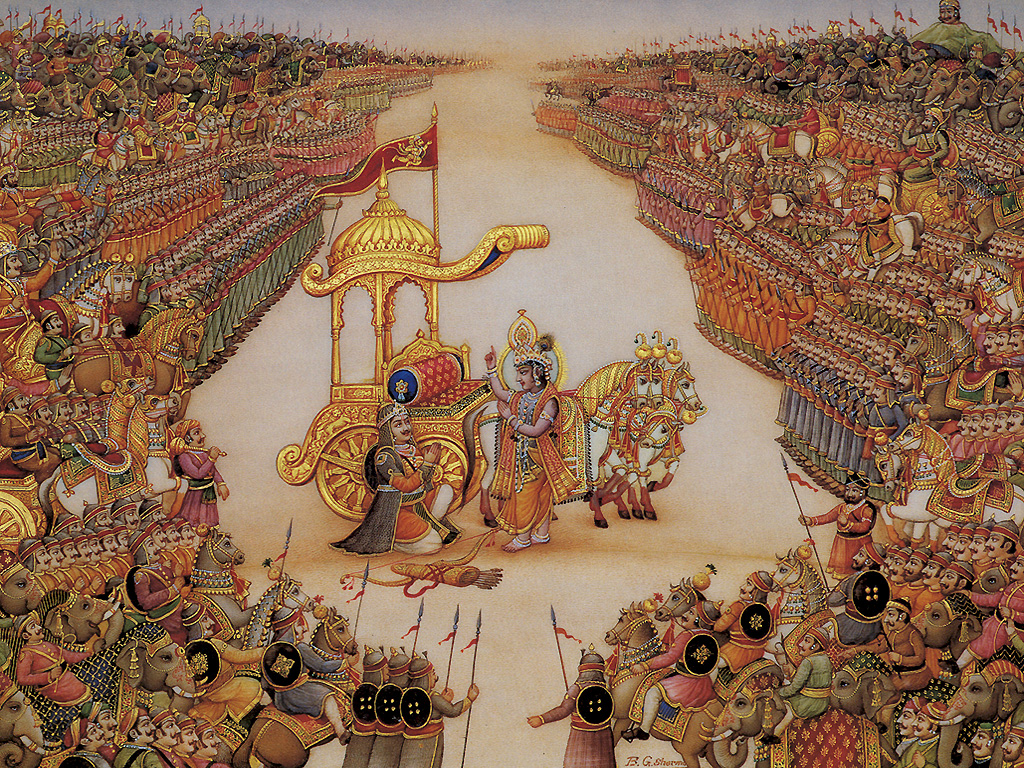
On the battle-plains of Kurukshetra, shortly before the Great Battle of the Mahabharata is about to begin, Arjuna is overcome by self-doubt. He thinks it is wrong to fight, to take part in the killing and the destruction of his own family and kinsmen. Krishna intercedes, and through a masterpiece of oratory, convinces him of the righteousness of war. The exchange between Arjuna and Krishna forms the basis of the Bhagavad Gita.
The Bhagavad Gita is a work of great lyrical genius, considered by many a source of moral and spiritual instruction and inspiration. But it may also have been a con job, carried out by Krishna on the unwitting Arjuna to ensure he takes part in the battle ahead.
Krishna wraps up his arguments in the language of righteousness, but there is another possibility: that Krishna uses the language of religion only to disguise a more pragmatic agenda, that the veneer of dharma and duty is only a clever polemicist's tactic, and Krishna has no real intention of trying to provide Arjuna meaningful moral instruction or guidance.
************************************************************************************
Example 1: The What Will Everybody Say? Argument
Krishna says the following -
The wise grieve not for those who live, and they grieve not for those who die - for life and death shall pass away (2:11)
From the world of the senses, Arjuna, comes heat and comes cold, and pleasure and pain...Arise above them, strong soul (2:14)
The man...beyond pleasure and pain, is worthy of life in Eternity (2:15)
Be in peace in pleasure and pain, in gain and in loss, in victory or in the loss of battle. In this peace there is no sin (2:38)
Do thy work...free from selfish desires, be not moved in success or in failure. (2:48)
Let us without reservation accept the above comments as sincere and well-meant. So Arjuna should be indifferent between
1. living and dying
2. heat and cold
3. pleasure and pain
4. gain and loss
5. victory and loss
6. success and failure
Arjuna is instructed to treat with equanimity the most fundamental experience of his life - this is a war which will see most of his own family - his guardian, his teachers, his son killed - but he should see beyond life and death. The pleasures and experiences of the senses, the joy of victory or gain or the sorrow of loss and suffering, even the feeling of heat or cold, he should rise beyond them all, treating them as one, resolute, indifferent, his mind at peace.
And yet, Krishna doesn't hesitate to also suggest in the same breath the following:
 Men will tell of thy dishonour... And to a man who is in honour, dishonour is worse than death (2:34)
Men will tell of thy dishonour... And to a man who is in honour, dishonour is worse than death (2:34)And thine enemies will speak of thee in contemptuous words of ill-will and derision, pouring scorn upon thy courage. Can there be for a warrior a more shameful fate? (2:36)
In 2:34, Krishna seems to be suggesting to Arjuna that people slandering him behind his back is worse than his family and hundreds of thousands of other people being killed. And while Arjuna should aim to be indifferent to the most fundamental and important aspects of his life, noticing neither hot or cold, not affected by the death of his wife or son, it would be unbearable to have people calling him names!
************************************************************************************
Example 2: The It is For Your Own Benefit Argument
Krishna says: See the comments in Example 1. Additionally, he also says
Set they heart upon thy work, but never on its rewards. Work not for a reward...(2:47)
Word done for a reward is much lower...How poor those who work for a reward! (2:49)
Krishna counsels Arjuna should fight because it's his duty as a warrior, without considering the rewards of doing his duty. But who earlier mentioned the rewards of doing one's duty in the first place? Let's see....
There is a war that opens the doors of heaven, Arjuna! Happy the warriors whose fate is to fight such war. (2:32)
In death thy glory in heaven, in victory thy glory on earth. (2:37)
If one should never do one's duty for the sake of the reward, then why mention the reward in the first place? What are the warriors meant to be happy about, why should Krishna twice remind Arjuna of the rewards of doing his duty? Another odd passage, with Krishna alternating between telling Arjuna he should do his duty without thought for its rewards, and telling him, Arjuna, think of the rewards!
***********************************************************************************
Are we to believe that all the above lines are mutually consistent and compatible? Or that Krishna was not clever enough to be aware of the contradictions in what he was saying? One could alternatively believe that getting called names is a more profound and serious matter than issues of life and death. Given the difficulties with all of these options, it seems conceivable to suggest that Krishna was a brilliant orator and polemicist, fully aware of his own hypocrisy. It was his intention to use every argument at his disposal, both honest and dishonest, to convince Arjuna to fight, even if he had to alternate between suggesting everyone getting killed was no big deal to saying a moment later that getting called names was. It certainly seems no more implausible an explanation than believing the Supreme Personality of Godhead can't even string a speech together without it contradicting itself.
 Anyway, good night everybody, and as the stickers and posters in this neighbourhood say these days, "Say Gouranga! And Be Happy!"
Anyway, good night everybody, and as the stickers and posters in this neighbourhood say these days, "Say Gouranga! And Be Happy!"Footnote:
All translated lines are taken out of preference from The Bhagavad Gita, translated by Juan Mascaro, Penguin Classics. Other translations including the one at asitis.com were also consulted.
moo....
